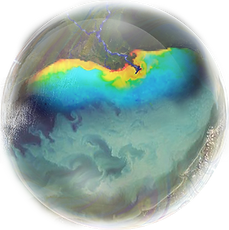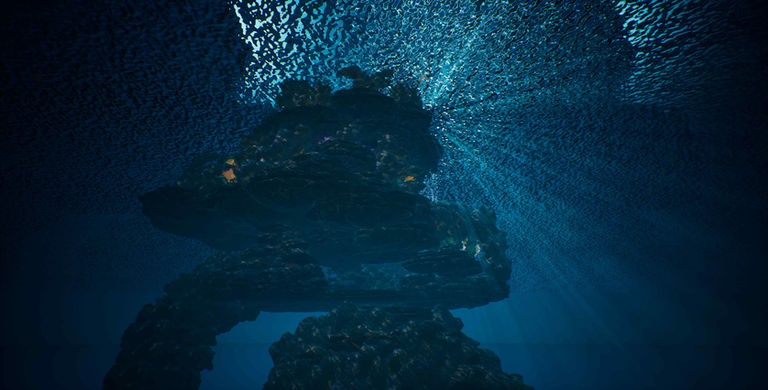
Your Mission in virtual reality
2
Explore the remnants of Mer, a magical lost civilization, and bring it back to life by overcoming challenges, planting vibrant coral gardens and lowering your real world CO footprint.

Expeditions
Some of the places, you will adventure, create and transform.
Lost City of Mer
The Secret Coral Garden
Cathedral Cave
Pirate Poacher Ship Graveyard

Interactive Innovation
Lost City of Mer is a cross-platform interactive experience
that combines a smartphone app with VR.




The project utilizes a groundbreaking living narrative structure
where your real-world actions impact the story that unfolds in VR.
The phone app, which directly interfaces with the VR world,
enables you to win rewards in the virtual world, through
cutting carbon emissions in the real world.
Watch the Lost City of Mer Trailer

Dives in Mer and Presentations
New York City, NY
Dives

Brisbane, Australia
Best XR Content Committee Award: 2nd Place
Best XR Content Audience Award: 2nd Place
September 23rd, 2019, United Nations, New York City, NY
SDG Action Zone dives, The General Assembly Climate Summit
September 27th, 2019, SDG Media Zone, United Nations, NY
Using Technology for Social Impact Panel - broadcast on UN TV

26th International Symposium on Electronic Art
Montreal, Canada
The University of Pennsylvania, Philadelphia, PA
Dives and talk by Liz Canner

United Nations Global Festival of Action 2020
World Conference Center, Bonn, Germany
Canceled due to the pandemic
Selected to exhibit and offer dives in Mer
Burlington, VT
Dives, lecture and discussion with Liz Canner
Champlain College

Vermont International Film Festival
Burlington, VT
Dives
The Media Factory
Burlington, VT
VR for Social Impact with Lost City of Mer Workshop
Michener Art Musuem
Postponed until further notice due to the pandemic
Exhibition and dives
New York Public Library Event for Administators and Educators
New York City, NY
Dives and Talk

The Explorers Club
New York City, NY
Dives for World Oceans Week
White River Indie Film Festival
White River Junction, VT
Dives

The Rockefeller University
New York City, NY
Prototype dive
The New York Videogame Critics Circle
New York City, NY
Prototype dive

Dartmouth College

Carnegie Institution for Science and
National Geographic, Washington, D.C.
Dives in multiple locations
New York City, NY
Dives for staff
School Library Journal
Hanover, NH
Dives and invited talk
Mixed/Augmented/Virtual Reality Innovation Conference
University of Maryland
Dives and invited talk
New York City, NY
Dives - Premiere of prototype/Chapter 1
Games for Change Festival

UN ARTS x SDG Online Festival
Online

The mysterious underwater Mer civilization and much of its flora
and fauna have been destroyed. You are the first Mer Baby born
in decades. Athina, a baby seal, befriends you and takes you
on a journey through the remnants of the metropolis.
Do you have what it takes to bring Mer and her otherworldly inhabitants back to life?
You swim, using unique navigation developed especially for the
game, and witness the devastating effects of ocean temperature
rise and acidification which have ruined Mer’s ecosystem. Information bubbles explain climate change science (coming soon
in Chapter Two) and gameplay rewards action such as planting
coral and reducing your carbon footprint. The more you invest in
positive action and life creation, the more vibrant and stunning
the ecosystem will become.

The Evolution and Extinction of Aquaprimates
Mer are aquaprimates. Physical and genetic similarities show that the modern Mer species has a very close relationship to homo sapiens. They share a common ancestor that lived between 8 and 6 million years ago. The first aquaprimates evolved off the coast of Africa in the Red Sea.
Paralleling the biological evolution of early Mer was the development of cultural technologies that allowed them to become increasingly successful at acquiring food and surviving predators. Advances in the Coral Age saw the development of high technology, sophisticated architecture and advanced science.
Playful and secretive in nature, the Mer kept their elaborate civilization hidden from homo sapiens. Humans long suspected their existence and records of Mer sightings go back thousands of years. They are known for their ability to sing in the most alluring way and generate an enthrallment with nature. Unfortunately, due to recent ocean acidification and temperature rise, the Mer are thought to be extinct.

Built on Climate Change Science
Lost City of Mer is built on science in order to educate and
activate the general public about the threat climate change poses
to the health of our planet. Coral reefs support a quarter of all marine species and are one of the most important ecosystems
on earth. It is estimated that by 2050 most of them will be gone
if there is not large scale action.
In Lost City of Mer learn about ocean temperature rise
and acidification, the threat posed by pollution,
over-fishing and solutions.
Science Bubbles



Your Mer scientist mom left clues in
bubble messages for you about how to
revive the mysterious Mer civilization.




Coral Planting has shown to be a viable method for restoring some dying reefs.
Design your own coral garden, and watch as it revives the ecosystem with exotic sea creatures.
Photo Credit: Smithsonian
Pollution
Polluted water pours into The Secret Coral Garden, the only place in Mer that is still alive. Can you stop the pollution and save the reef?
A science bubble reveals that industrial agriculture is pouring reactive nitrogen and phosphorous into the oceans through rivers, creating “ocean dead zones”. We have the ability to rectify coastal pollution by changing farming practices.

The Secret Coral Garden

Carbon Dioxide Meter
Functionality Coming Soon in Chapter Two


The CO2 and water temperature meter responds to the player's real world actions to lower their carbon footprint as a form of gameplay and informs players about the impact of carbon on the ocean.

Lost City of Mer was created in Unreal Engine for HTC Vive. The smartphone app is available for Apple and Android devices.
Funding
Auckland University of Technology
Individual Donations
Supporters


Collaborator






































